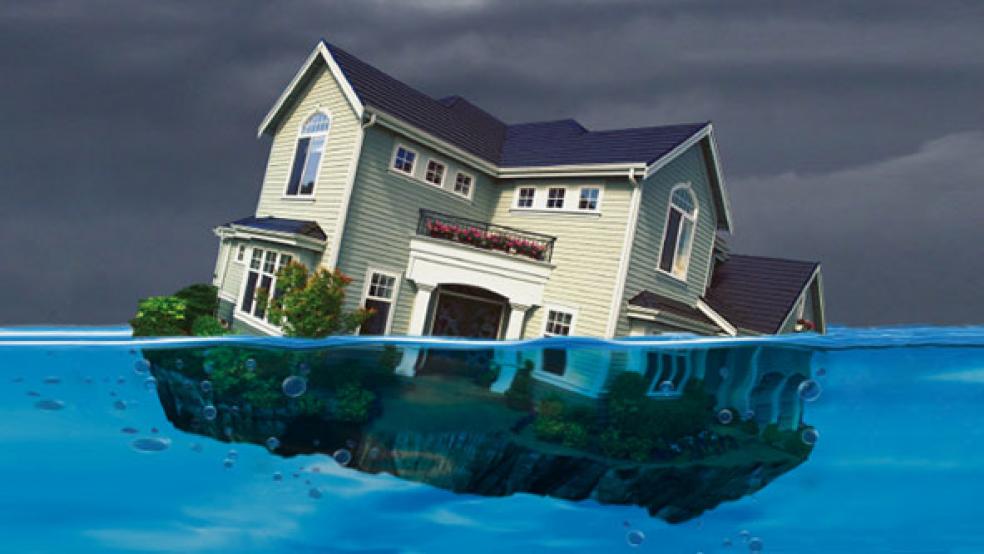Hilton Head, located off the coast of South Carolina, is a stunning 12-mile island of pristine golf courses and unsullied beaches— a family-friendly paradise. Many of the 34,000 residents are decidedly upscale: Just over half have a college degree, compared with 27 percent nationwide; median household income, at $68,3337, is well above the 2009 national average of $51,425; and the median owner-occupied home was worth almost three times the national median in 2009, according to the most recent census numbers available.
But underneath that façade lies a microcosm of a troubling national trend for homeowners and local governments: the housing double dip.
In the past year, home prices in Hilton Head have dropped off a cliff: According to Zillow, they have plunged 19.3 percent since this time last year, to $287,000. This comes on the heels of a drastic drop between 2006 and 2009: from a median home price of $611,000at its peak in 2006 to $409,000 in April 2009. The market then stabilized and even rose slightly in the ensuing months, only to return to its downward trajectory by late 2009. Prices are now below their 2001 levels.
This reflects the trend nationwide: After a brief period of stabilization in early 2010, prices have fallen for more than 57 consecutive weeks. Between March 2010 and March 2011, the market saw an 8.2 percent decline. Over the past few weeks, a widespread fear of a double dip has become reality.
What little housing recovery the country saw may have been an illusion: It corresponded closely with a $8,000 first-time-homebuyers tax credit. The credit expired in April 2010, and the last monthly increase in home values was March of that year. The slight rebound “may have been entirely due to the tax credit,” says Patrick Newport, an economist at the research and consulting form his Global Insight. The credit expired in April 2010 – the last month that saw an increase in home values was March of that year.
Before housing can recover, a couple of things have to happen. The first and most important is jobs. “The housing market will pick up when there are more jobs,” says Beth Larson, principal at Evermay Wealth Management. Second, foreclosures have to peter out and the market has to work through the excess housing inventory. “We have so many bad loans in the pipeline that are still going to go through the foreclosure process,” says Newport. “That’s going to continue to drive prices down.” More than 219,000 foreclosure filings were reported in April, and 1 in every 593 housing units is in foreclosure, according to RealtyTrac. Total housing inventory at the end of March rose 1.5 percent to 3.55 million existing homes available for sale, or about an 8.4-month supply, according to the National Association of Realtors.
Newport predicts that home prices will fall an additional 7 percent this year, while Capital Economics economist Paul Dales has them dropping at least 5 percent further. Zillow economist Stan Humphries says prices will bottom out sometime in 2012. In other words, the housing market still has a way to go before the worst is behind it.
Lower Prices, Lower Tax Revenues
In the meantime, the housing market’s struggles are taking a toll on both individuals and cash-strapped governments.
In Hilton Head, like many cities around the country, real estate is central to funding the government. Hilton Head currently derives 24 percent of its budget from property taxes – its biggest source of revenue. Susan Simmons, director of finance for the city, does not expect to feel the full impact of the housing bust until properties are reassessed late next year. The government is currently trying to determine if state law allows it to increase the tax rate in order to compensate for lower home values. “If it’s legal, and if the public doesn’t outcry … we won’t be impacted that much by the property tax,” says Simmons.
But if history is any guide, Simmons is being optimistic. In Beaufort County, where Hilton Head is located, 15,000 homeowners—accounting for a third of housing units in the county-- appealed their last property tax assessment in 2009, according to county assessor, a 36 percent increase over the previous assessment.
Property taxes are only part of the picture for Hilton Head, however. The city also charges a “real estate transfer” tax on all properties that change hands. The housing crash decimated revenues from this channel: In 2005, the tax generated $6.7 million. Last year that number dwindled to $2 million. This year, Simmons expects the city to bring in only $1.7 million from the tax as the real estate market continues to limp along.
Life in the Slump
For residents of Hilton Head, the housing crash has sobered the giddy American dream of homeownership. Across the country, household wealth plunged 23 percent just in the two years between 2007 and 2009, largely due to the decline in home values, according to a March report from the Federal Reserve.
Joe Albano, a New Jersey resident, bought a home in Hilton Head seven years ago and has been renting it out most of the year ever since. “We bought it with the plan to relocate here and considered the house a hedge against future value increases,” he says. But Albano says his property taxes have gone up steadily, while his home’s value has dropped an estimated 10 to 15 percent. With three-quarters of his family’s wealth tied up in real estate, “spending habits had to adjust as we watched that decline,” he says.
When the Albano family decided a couple of years ago to relocate to the South permanently, earlier than originally expected, they put the Hilton Head property on the market with the hope of trading in for something more family friendly. “We had it on the market for a year. That was awful. Only one or two people even came to look,” says Albano, and no one offered to buy. A couple of months ago, though, they put the house back up for sale, and while they haven’t been flooded with offers, more people are coming through to have a look.
Those people may include potential foreign buyers looking to take advantage of the weak U.S. dollar and low home prices. According to yesterday’s 2011 Profile of International Home Buying Activity from the National Association of Realtors, total international sales of U.S. residences are up 24 percent this year, to $82 billion.
In Hilton Head, everyone is looking for a deal, says Robert Young, owner and broker of Hilton Head Real Estate Company, and he is starting to see foreclosure and short sales gaining steam. “They are buying all the low hanging fruit — especially the million-dollar buyers,” he said.
Still Albano is wary. “I don’t think the recovery will bring the speculative investment property buys back for some time and that will impact my home’s re-salability for years,” he says. And he has reason for his skepticism. IHS’s Newport predicts that home prices won’t get back to their peak in 2006 until 2021, adjusted for inflation. That’s a long wait.
Related Links:
Home Prices: The Double Dip Is Near (CNN Money)
Official Figures Show Double Dip (Planet Property Blog)
Clear Capital Home Price Index Shows Double Dip (Calculated Risk)






